Understanding Social Needs: Mental Health in Australian Coal Mining
VerifiedAdded on 2020/10/23
|8
|1978
|236
Report
AI Summary
This report provides a comprehensive analysis of mental health needs in Australia, with a specific focus on the coal mining industry. It defines social needs and mental health, identifies the affected group (coal miners), and examines the social determinants influencing their well-being, such as workplace factors and remote locations. The report delves into historical and current community responses, highlighting the evolution of attitudes and government initiatives, including policy changes and funding commitments. It also identifies loopholes in government policies and offers recommendations for improvement, such as ensuring proper fund utilization, promoting a mentally healthy work environment, encouraging employer contributions, fostering employee support, and implementing e-health solutions. The report concludes by emphasizing the need for a multi-faceted approach to address the mental health challenges faced by coal miners and meet their social needs effectively. It references various sources to support its findings.
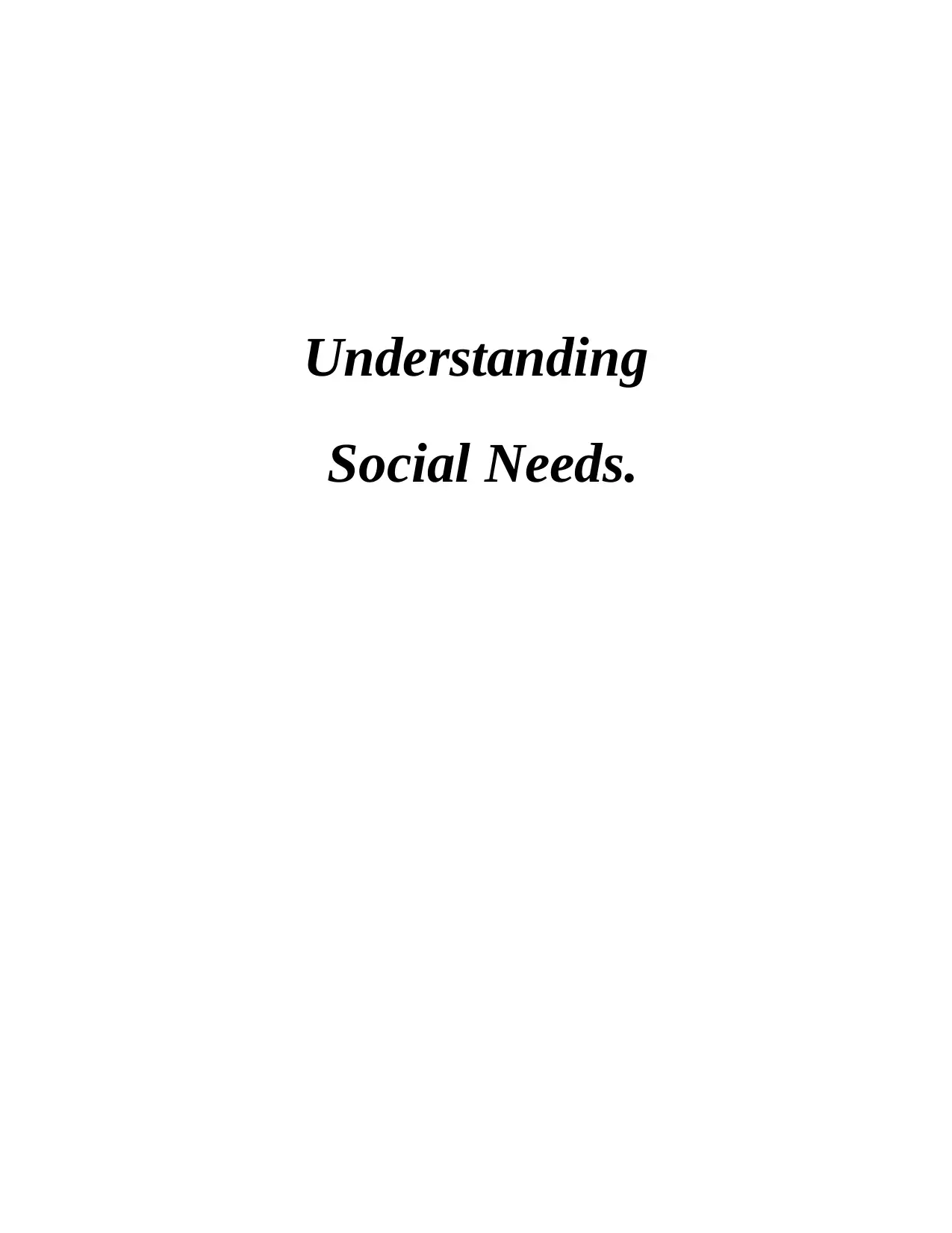
Understanding
Social Needs.
Social Needs.
Paraphrase This Document
Need a fresh take? Get an instant paraphrase of this document with our AI Paraphraser
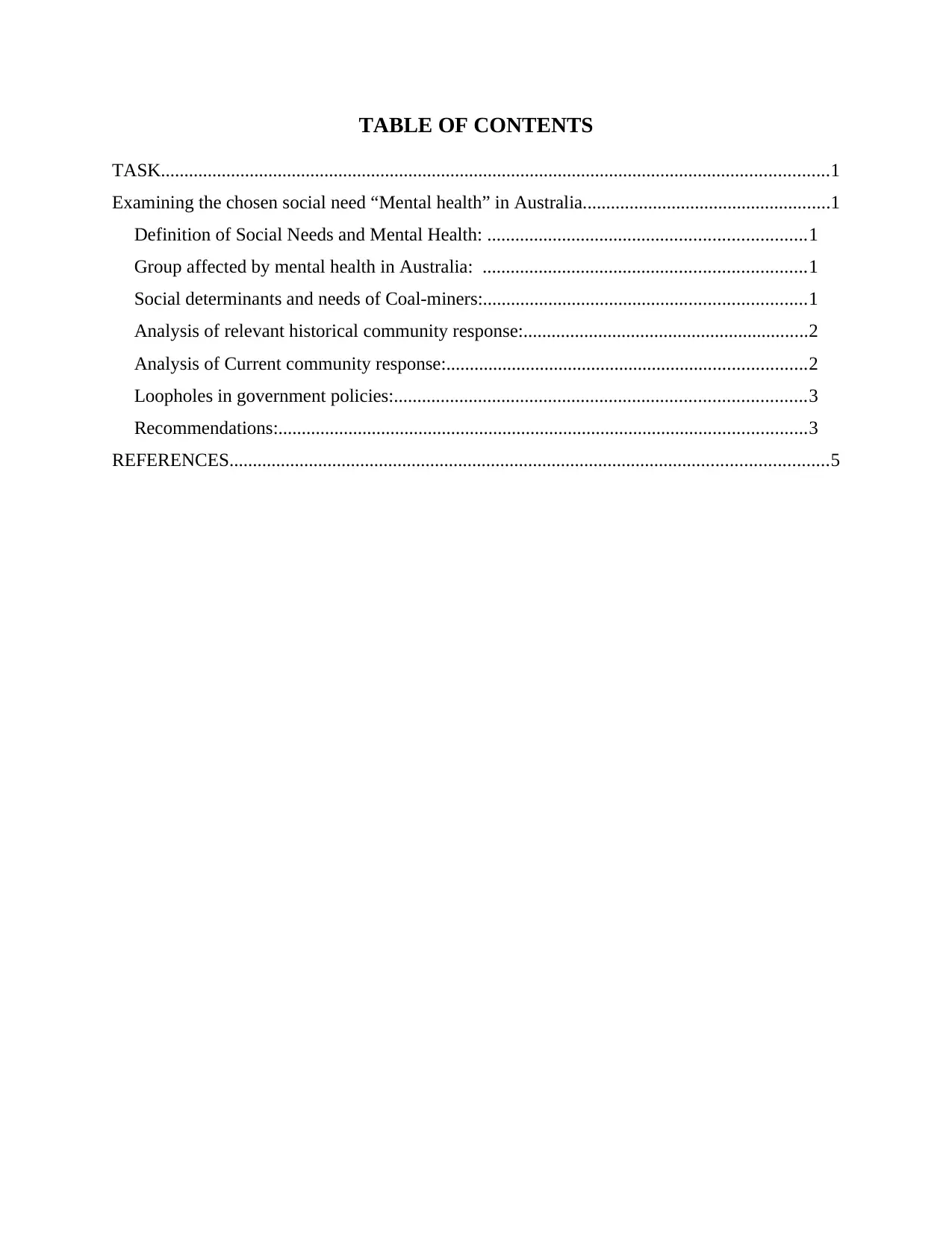
TABLE OF CONTENTS
TASK...............................................................................................................................................1
Examining the chosen social need “Mental health” in Australia.....................................................1
Definition of Social Needs and Mental Health: ....................................................................1
Group affected by mental health in Australia: .....................................................................1
Social determinants and needs of Coal-miners:.....................................................................1
Analysis of relevant historical community response:.............................................................2
Analysis of Current community response:.............................................................................2
Loopholes in government policies:........................................................................................3
Recommendations:.................................................................................................................3
REFERENCES................................................................................................................................5
TASK...............................................................................................................................................1
Examining the chosen social need “Mental health” in Australia.....................................................1
Definition of Social Needs and Mental Health: ....................................................................1
Group affected by mental health in Australia: .....................................................................1
Social determinants and needs of Coal-miners:.....................................................................1
Analysis of relevant historical community response:.............................................................2
Analysis of Current community response:.............................................................................2
Loopholes in government policies:........................................................................................3
Recommendations:.................................................................................................................3
REFERENCES................................................................................................................................5
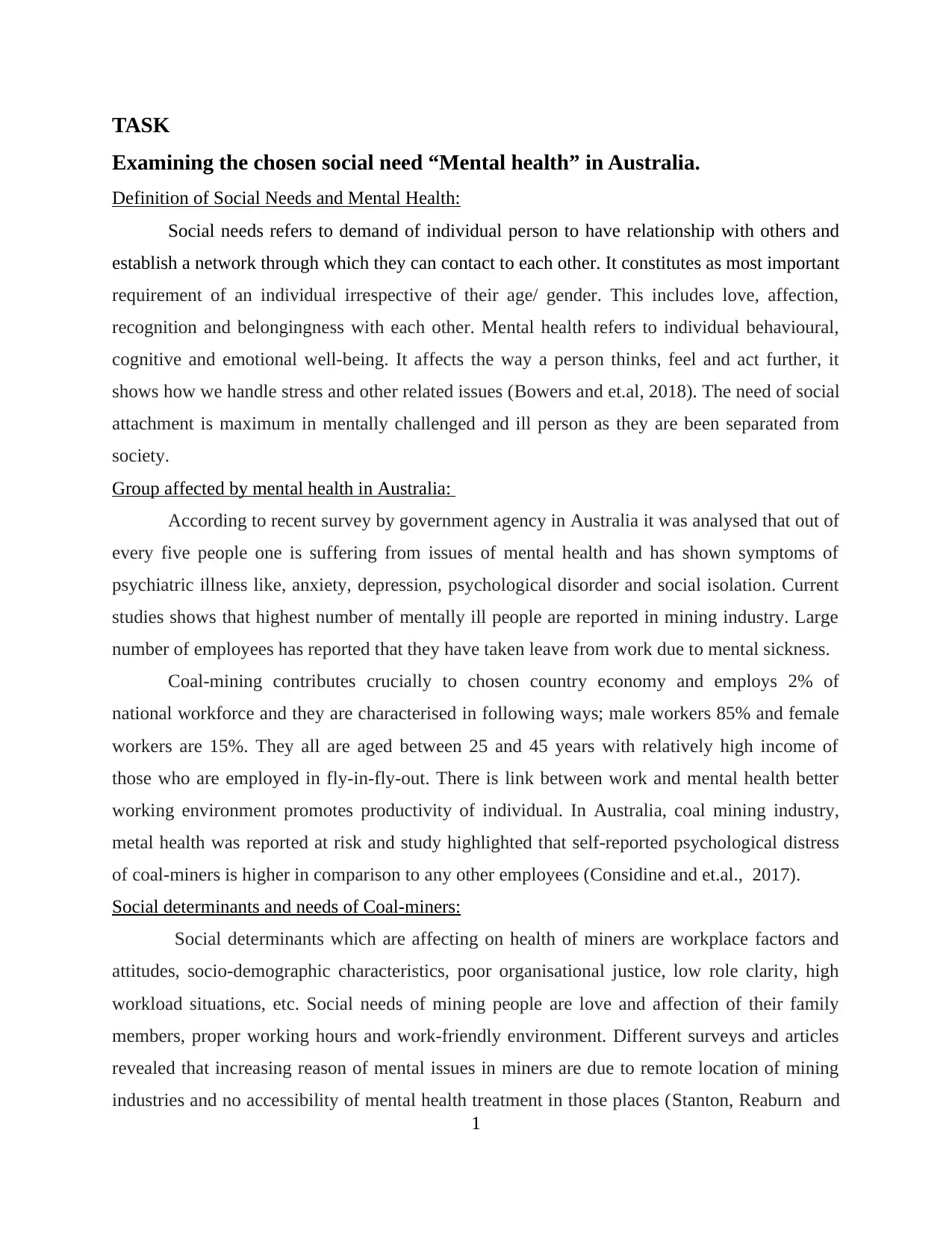
TASK
Examining the chosen social need “Mental health” in Australia.
Definition of Social Needs and Mental Health:
Social needs refers to demand of individual person to have relationship with others and
establish a network through which they can contact to each other. It constitutes as most important
requirement of an individual irrespective of their age/ gender. This includes love, affection,
recognition and belongingness with each other. Mental health refers to individual behavioural,
cognitive and emotional well-being. It affects the way a person thinks, feel and act further, it
shows how we handle stress and other related issues (Bowers and et.al, 2018). The need of social
attachment is maximum in mentally challenged and ill person as they are been separated from
society.
Group affected by mental health in Australia:
According to recent survey by government agency in Australia it was analysed that out of
every five people one is suffering from issues of mental health and has shown symptoms of
psychiatric illness like, anxiety, depression, psychological disorder and social isolation. Current
studies shows that highest number of mentally ill people are reported in mining industry. Large
number of employees has reported that they have taken leave from work due to mental sickness.
Coal-mining contributes crucially to chosen country economy and employs 2% of
national workforce and they are characterised in following ways; male workers 85% and female
workers are 15%. They all are aged between 25 and 45 years with relatively high income of
those who are employed in fly-in-fly-out. There is link between work and mental health better
working environment promotes productivity of individual. In Australia, coal mining industry,
metal health was reported at risk and study highlighted that self-reported psychological distress
of coal-miners is higher in comparison to any other employees (Considine and et.al., 2017).
Social determinants and needs of Coal-miners:
Social determinants which are affecting on health of miners are workplace factors and
attitudes, socio-demographic characteristics, poor organisational justice, low role clarity, high
workload situations, etc. Social needs of mining people are love and affection of their family
members, proper working hours and work-friendly environment. Different surveys and articles
revealed that increasing reason of mental issues in miners are due to remote location of mining
industries and no accessibility of mental health treatment in those places (Stanton, Reaburn and
1
Examining the chosen social need “Mental health” in Australia.
Definition of Social Needs and Mental Health:
Social needs refers to demand of individual person to have relationship with others and
establish a network through which they can contact to each other. It constitutes as most important
requirement of an individual irrespective of their age/ gender. This includes love, affection,
recognition and belongingness with each other. Mental health refers to individual behavioural,
cognitive and emotional well-being. It affects the way a person thinks, feel and act further, it
shows how we handle stress and other related issues (Bowers and et.al, 2018). The need of social
attachment is maximum in mentally challenged and ill person as they are been separated from
society.
Group affected by mental health in Australia:
According to recent survey by government agency in Australia it was analysed that out of
every five people one is suffering from issues of mental health and has shown symptoms of
psychiatric illness like, anxiety, depression, psychological disorder and social isolation. Current
studies shows that highest number of mentally ill people are reported in mining industry. Large
number of employees has reported that they have taken leave from work due to mental sickness.
Coal-mining contributes crucially to chosen country economy and employs 2% of
national workforce and they are characterised in following ways; male workers 85% and female
workers are 15%. They all are aged between 25 and 45 years with relatively high income of
those who are employed in fly-in-fly-out. There is link between work and mental health better
working environment promotes productivity of individual. In Australia, coal mining industry,
metal health was reported at risk and study highlighted that self-reported psychological distress
of coal-miners is higher in comparison to any other employees (Considine and et.al., 2017).
Social determinants and needs of Coal-miners:
Social determinants which are affecting on health of miners are workplace factors and
attitudes, socio-demographic characteristics, poor organisational justice, low role clarity, high
workload situations, etc. Social needs of mining people are love and affection of their family
members, proper working hours and work-friendly environment. Different surveys and articles
revealed that increasing reason of mental issues in miners are due to remote location of mining
industries and no accessibility of mental health treatment in those places (Stanton, Reaburn and
1
⊘ This is a preview!⊘
Do you want full access?
Subscribe today to unlock all pages.

Trusted by 1+ million students worldwide
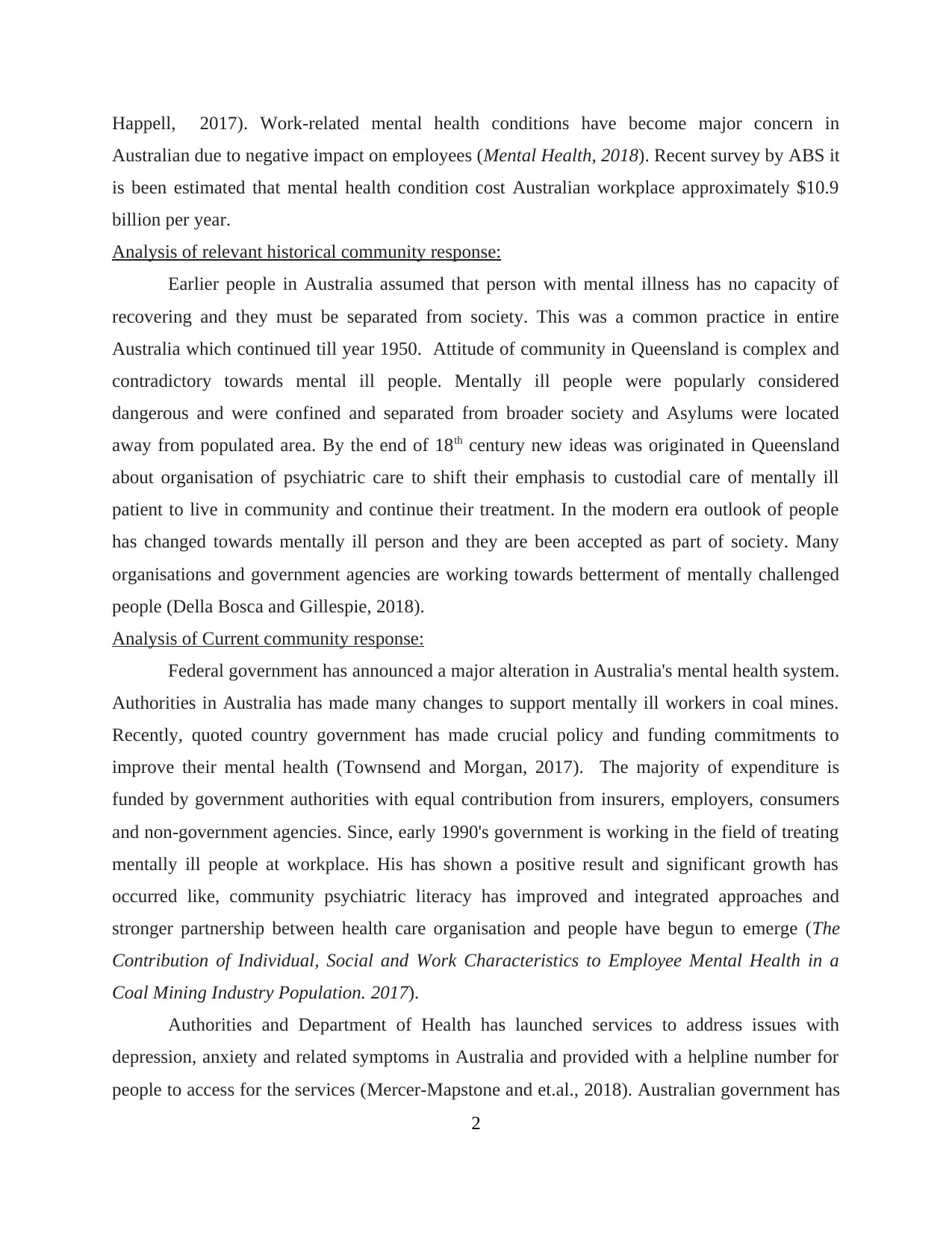
Happell, 2017). Work-related mental health conditions have become major concern in
Australian due to negative impact on employees (Mental Health, 2018). Recent survey by ABS it
is been estimated that mental health condition cost Australian workplace approximately $10.9
billion per year.
Analysis of relevant historical community response:
Earlier people in Australia assumed that person with mental illness has no capacity of
recovering and they must be separated from society. This was a common practice in entire
Australia which continued till year 1950. Attitude of community in Queensland is complex and
contradictory towards mental ill people. Mentally ill people were popularly considered
dangerous and were confined and separated from broader society and Asylums were located
away from populated area. By the end of 18th century new ideas was originated in Queensland
about organisation of psychiatric care to shift their emphasis to custodial care of mentally ill
patient to live in community and continue their treatment. In the modern era outlook of people
has changed towards mentally ill person and they are been accepted as part of society. Many
organisations and government agencies are working towards betterment of mentally challenged
people (Della Bosca and Gillespie, 2018).
Analysis of Current community response:
Federal government has announced a major alteration in Australia's mental health system.
Authorities in Australia has made many changes to support mentally ill workers in coal mines.
Recently, quoted country government has made crucial policy and funding commitments to
improve their mental health (Townsend and Morgan, 2017). The majority of expenditure is
funded by government authorities with equal contribution from insurers, employers, consumers
and non-government agencies. Since, early 1990's government is working in the field of treating
mentally ill people at workplace. His has shown a positive result and significant growth has
occurred like, community psychiatric literacy has improved and integrated approaches and
stronger partnership between health care organisation and people have begun to emerge (The
Contribution of Individual, Social and Work Characteristics to Employee Mental Health in a
Coal Mining Industry Population. 2017).
Authorities and Department of Health has launched services to address issues with
depression, anxiety and related symptoms in Australia and provided with a helpline number for
people to access for the services (Mercer-Mapstone and et.al., 2018). Australian government has
2
Australian due to negative impact on employees (Mental Health, 2018). Recent survey by ABS it
is been estimated that mental health condition cost Australian workplace approximately $10.9
billion per year.
Analysis of relevant historical community response:
Earlier people in Australia assumed that person with mental illness has no capacity of
recovering and they must be separated from society. This was a common practice in entire
Australia which continued till year 1950. Attitude of community in Queensland is complex and
contradictory towards mental ill people. Mentally ill people were popularly considered
dangerous and were confined and separated from broader society and Asylums were located
away from populated area. By the end of 18th century new ideas was originated in Queensland
about organisation of psychiatric care to shift their emphasis to custodial care of mentally ill
patient to live in community and continue their treatment. In the modern era outlook of people
has changed towards mentally ill person and they are been accepted as part of society. Many
organisations and government agencies are working towards betterment of mentally challenged
people (Della Bosca and Gillespie, 2018).
Analysis of Current community response:
Federal government has announced a major alteration in Australia's mental health system.
Authorities in Australia has made many changes to support mentally ill workers in coal mines.
Recently, quoted country government has made crucial policy and funding commitments to
improve their mental health (Townsend and Morgan, 2017). The majority of expenditure is
funded by government authorities with equal contribution from insurers, employers, consumers
and non-government agencies. Since, early 1990's government is working in the field of treating
mentally ill people at workplace. His has shown a positive result and significant growth has
occurred like, community psychiatric literacy has improved and integrated approaches and
stronger partnership between health care organisation and people have begun to emerge (The
Contribution of Individual, Social and Work Characteristics to Employee Mental Health in a
Coal Mining Industry Population. 2017).
Authorities and Department of Health has launched services to address issues with
depression, anxiety and related symptoms in Australia and provided with a helpline number for
people to access for the services (Mercer-Mapstone and et.al., 2018). Australian government has
2
Paraphrase This Document
Need a fresh take? Get an instant paraphrase of this document with our AI Paraphraser
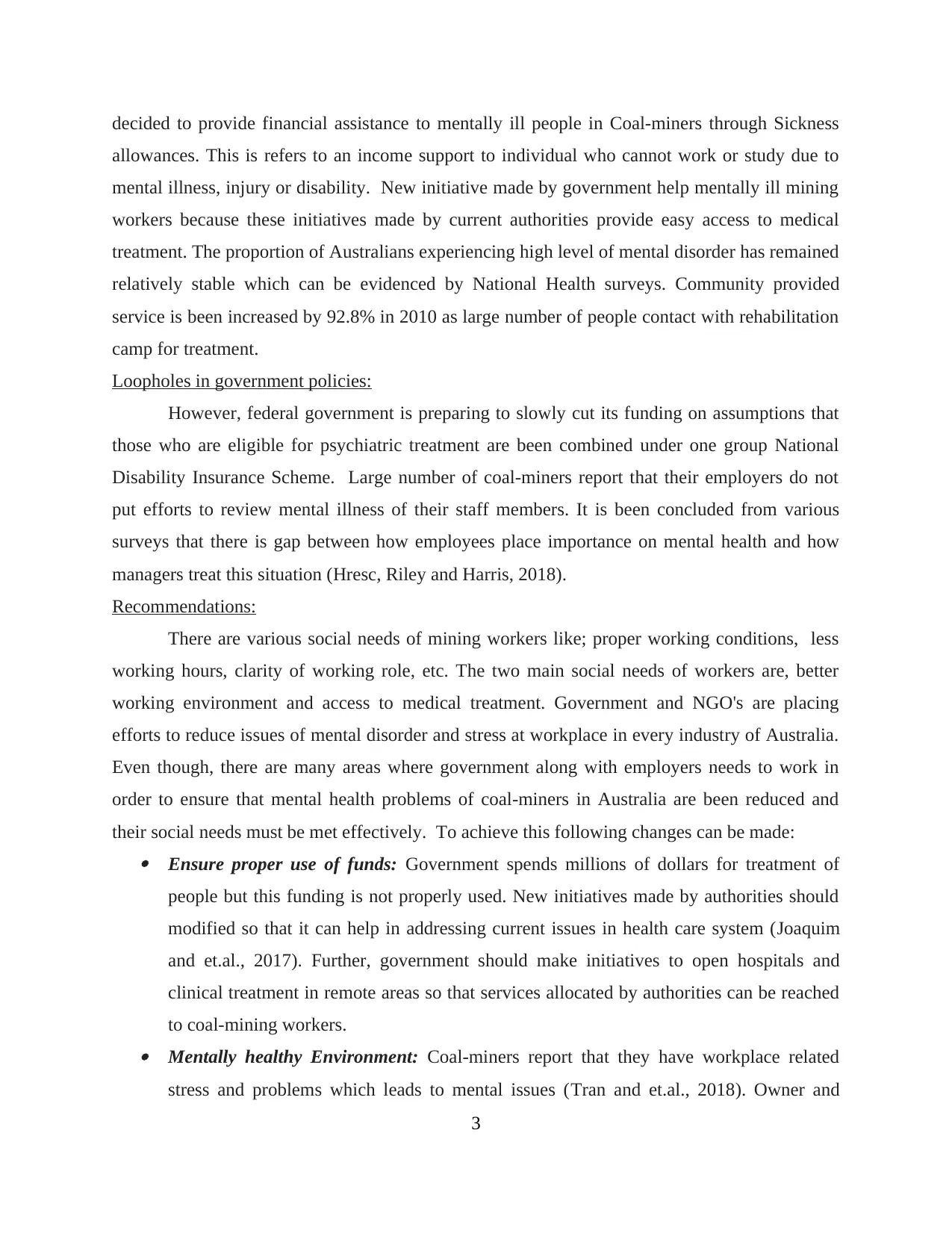
decided to provide financial assistance to mentally ill people in Coal-miners through Sickness
allowances. This is refers to an income support to individual who cannot work or study due to
mental illness, injury or disability. New initiative made by government help mentally ill mining
workers because these initiatives made by current authorities provide easy access to medical
treatment. The proportion of Australians experiencing high level of mental disorder has remained
relatively stable which can be evidenced by National Health surveys. Community provided
service is been increased by 92.8% in 2010 as large number of people contact with rehabilitation
camp for treatment.
Loopholes in government policies:
However, federal government is preparing to slowly cut its funding on assumptions that
those who are eligible for psychiatric treatment are been combined under one group National
Disability Insurance Scheme. Large number of coal-miners report that their employers do not
put efforts to review mental illness of their staff members. It is been concluded from various
surveys that there is gap between how employees place importance on mental health and how
managers treat this situation (Hresc, Riley and Harris, 2018).
Recommendations:
There are various social needs of mining workers like; proper working conditions, less
working hours, clarity of working role, etc. The two main social needs of workers are, better
working environment and access to medical treatment. Government and NGO's are placing
efforts to reduce issues of mental disorder and stress at workplace in every industry of Australia.
Even though, there are many areas where government along with employers needs to work in
order to ensure that mental health problems of coal-miners in Australia are been reduced and
their social needs must be met effectively. To achieve this following changes can be made: Ensure proper use of funds: Government spends millions of dollars for treatment of
people but this funding is not properly used. New initiatives made by authorities should
modified so that it can help in addressing current issues in health care system (Joaquim
and et.al., 2017). Further, government should make initiatives to open hospitals and
clinical treatment in remote areas so that services allocated by authorities can be reached
to coal-mining workers. Mentally healthy Environment: Coal-miners report that they have workplace related
stress and problems which leads to mental issues (Tran and et.al., 2018). Owner and
3
allowances. This is refers to an income support to individual who cannot work or study due to
mental illness, injury or disability. New initiative made by government help mentally ill mining
workers because these initiatives made by current authorities provide easy access to medical
treatment. The proportion of Australians experiencing high level of mental disorder has remained
relatively stable which can be evidenced by National Health surveys. Community provided
service is been increased by 92.8% in 2010 as large number of people contact with rehabilitation
camp for treatment.
Loopholes in government policies:
However, federal government is preparing to slowly cut its funding on assumptions that
those who are eligible for psychiatric treatment are been combined under one group National
Disability Insurance Scheme. Large number of coal-miners report that their employers do not
put efforts to review mental illness of their staff members. It is been concluded from various
surveys that there is gap between how employees place importance on mental health and how
managers treat this situation (Hresc, Riley and Harris, 2018).
Recommendations:
There are various social needs of mining workers like; proper working conditions, less
working hours, clarity of working role, etc. The two main social needs of workers are, better
working environment and access to medical treatment. Government and NGO's are placing
efforts to reduce issues of mental disorder and stress at workplace in every industry of Australia.
Even though, there are many areas where government along with employers needs to work in
order to ensure that mental health problems of coal-miners in Australia are been reduced and
their social needs must be met effectively. To achieve this following changes can be made: Ensure proper use of funds: Government spends millions of dollars for treatment of
people but this funding is not properly used. New initiatives made by authorities should
modified so that it can help in addressing current issues in health care system (Joaquim
and et.al., 2017). Further, government should make initiatives to open hospitals and
clinical treatment in remote areas so that services allocated by authorities can be reached
to coal-mining workers. Mentally healthy Environment: Coal-miners report that they have workplace related
stress and problems which leads to mental issues (Tran and et.al., 2018). Owner and
3
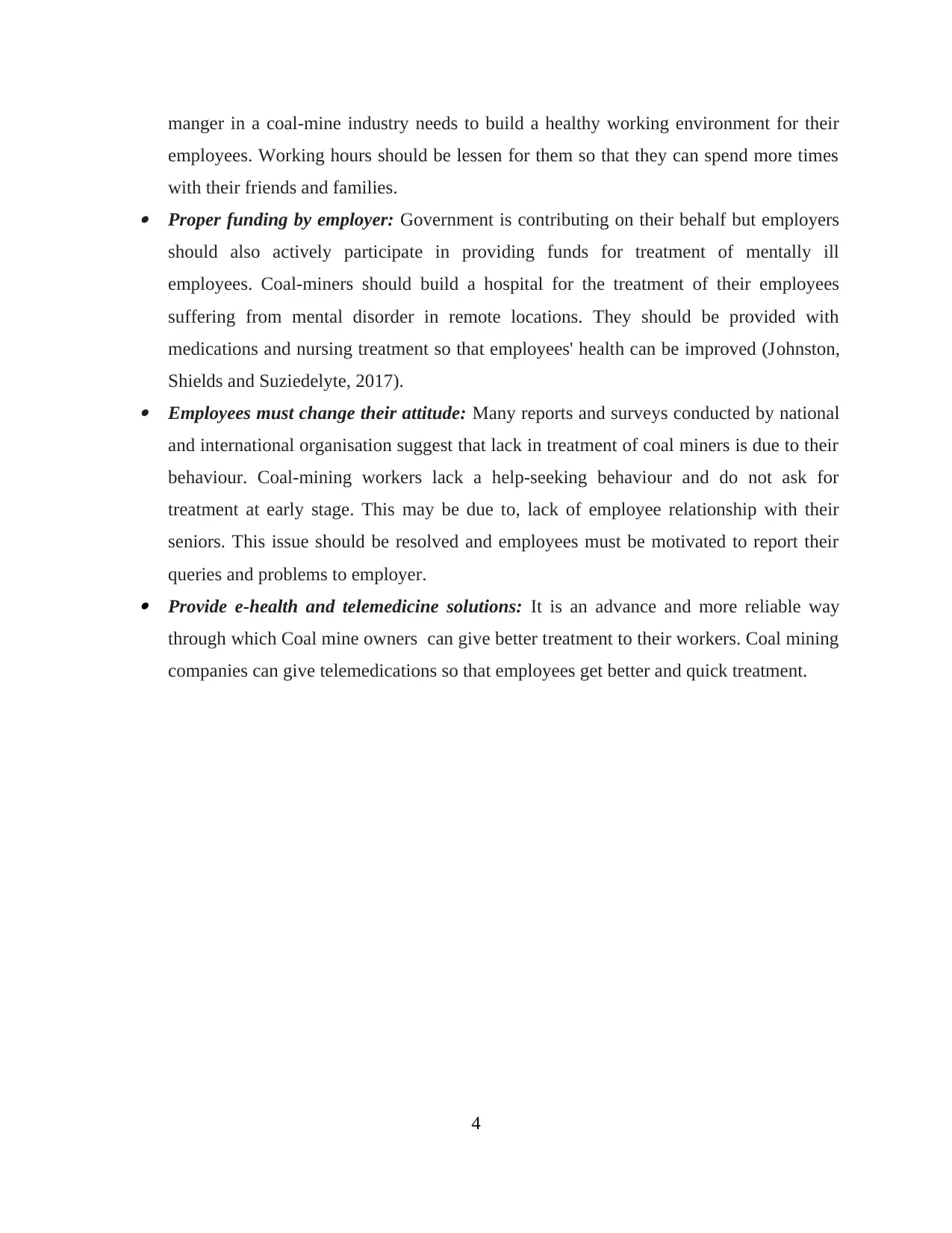
manger in a coal-mine industry needs to build a healthy working environment for their
employees. Working hours should be lessen for them so that they can spend more times
with their friends and families. Proper funding by employer: Government is contributing on their behalf but employers
should also actively participate in providing funds for treatment of mentally ill
employees. Coal-miners should build a hospital for the treatment of their employees
suffering from mental disorder in remote locations. They should be provided with
medications and nursing treatment so that employees' health can be improved (Johnston,
Shields and Suziedelyte, 2017). Employees must change their attitude: Many reports and surveys conducted by national
and international organisation suggest that lack in treatment of coal miners is due to their
behaviour. Coal-mining workers lack a help-seeking behaviour and do not ask for
treatment at early stage. This may be due to, lack of employee relationship with their
seniors. This issue should be resolved and employees must be motivated to report their
queries and problems to employer. Provide e-health and telemedicine solutions: It is an advance and more reliable way
through which Coal mine owners can give better treatment to their workers. Coal mining
companies can give telemedications so that employees get better and quick treatment.
4
employees. Working hours should be lessen for them so that they can spend more times
with their friends and families. Proper funding by employer: Government is contributing on their behalf but employers
should also actively participate in providing funds for treatment of mentally ill
employees. Coal-miners should build a hospital for the treatment of their employees
suffering from mental disorder in remote locations. They should be provided with
medications and nursing treatment so that employees' health can be improved (Johnston,
Shields and Suziedelyte, 2017). Employees must change their attitude: Many reports and surveys conducted by national
and international organisation suggest that lack in treatment of coal miners is due to their
behaviour. Coal-mining workers lack a help-seeking behaviour and do not ask for
treatment at early stage. This may be due to, lack of employee relationship with their
seniors. This issue should be resolved and employees must be motivated to report their
queries and problems to employer. Provide e-health and telemedicine solutions: It is an advance and more reliable way
through which Coal mine owners can give better treatment to their workers. Coal mining
companies can give telemedications so that employees get better and quick treatment.
4
⊘ This is a preview!⊘
Do you want full access?
Subscribe today to unlock all pages.

Trusted by 1+ million students worldwide
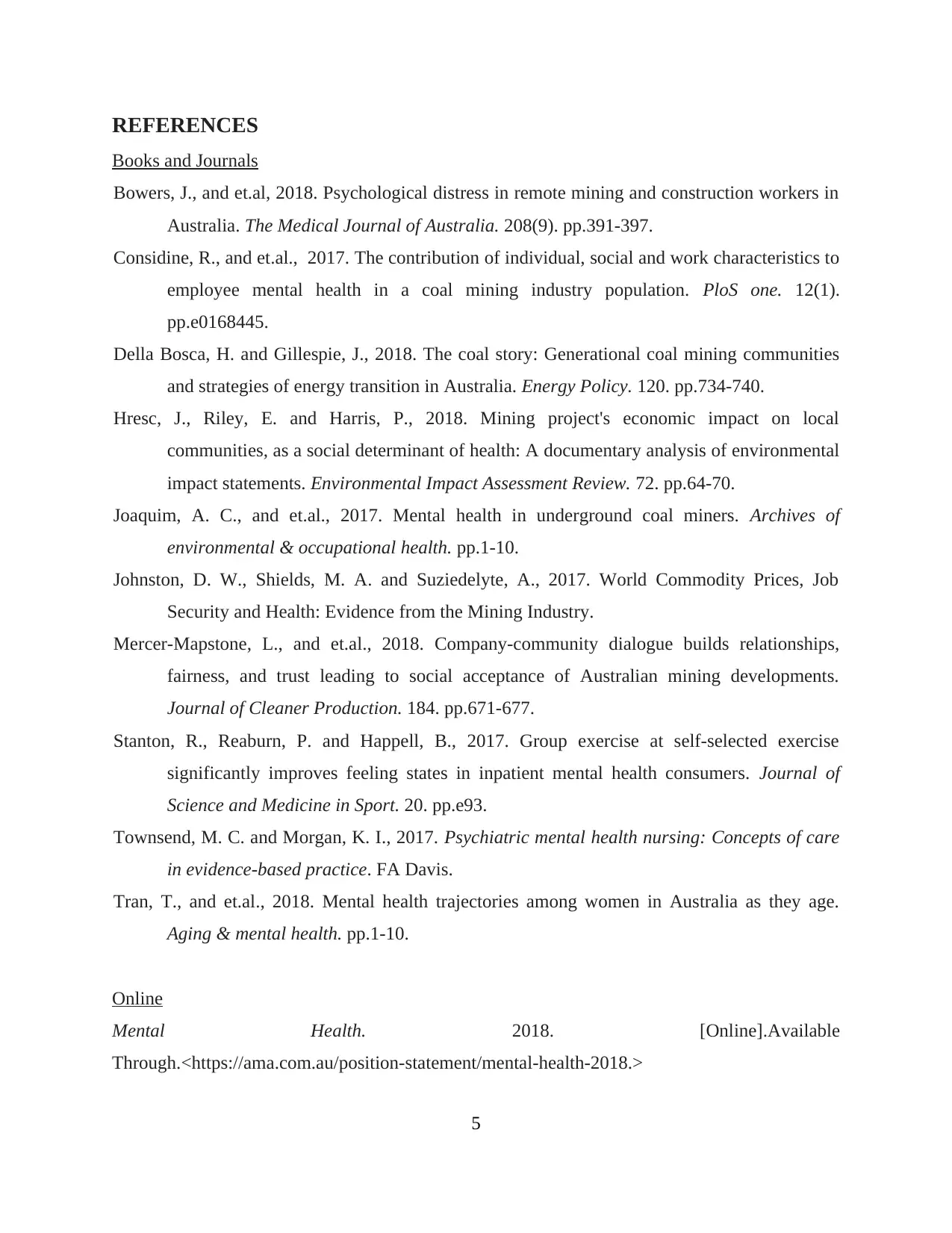
REFERENCES
Books and Journals
Bowers, J., and et.al, 2018. Psychological distress in remote mining and construction workers in
Australia. The Medical Journal of Australia. 208(9). pp.391-397.
Considine, R., and et.al., 2017. The contribution of individual, social and work characteristics to
employee mental health in a coal mining industry population. PloS one. 12(1).
pp.e0168445.
Della Bosca, H. and Gillespie, J., 2018. The coal story: Generational coal mining communities
and strategies of energy transition in Australia. Energy Policy. 120. pp.734-740.
Hresc, J., Riley, E. and Harris, P., 2018. Mining project's economic impact on local
communities, as a social determinant of health: A documentary analysis of environmental
impact statements. Environmental Impact Assessment Review. 72. pp.64-70.
Joaquim, A. C., and et.al., 2017. Mental health in underground coal miners. Archives of
environmental & occupational health. pp.1-10.
Johnston, D. W., Shields, M. A. and Suziedelyte, A., 2017. World Commodity Prices, Job
Security and Health: Evidence from the Mining Industry.
Mercer-Mapstone, L., and et.al., 2018. Company-community dialogue builds relationships,
fairness, and trust leading to social acceptance of Australian mining developments.
Journal of Cleaner Production. 184. pp.671-677.
Stanton, R., Reaburn, P. and Happell, B., 2017. Group exercise at self-selected exercise
significantly improves feeling states in inpatient mental health consumers. Journal of
Science and Medicine in Sport. 20. pp.e93.
Townsend, M. C. and Morgan, K. I., 2017. Psychiatric mental health nursing: Concepts of care
in evidence-based practice. FA Davis.
Tran, T., and et.al., 2018. Mental health trajectories among women in Australia as they age.
Aging & mental health. pp.1-10.
Online
Mental Health. 2018. [Online].Available
Through.<https://ama.com.au/position-statement/mental-health-2018.>
5
Books and Journals
Bowers, J., and et.al, 2018. Psychological distress in remote mining and construction workers in
Australia. The Medical Journal of Australia. 208(9). pp.391-397.
Considine, R., and et.al., 2017. The contribution of individual, social and work characteristics to
employee mental health in a coal mining industry population. PloS one. 12(1).
pp.e0168445.
Della Bosca, H. and Gillespie, J., 2018. The coal story: Generational coal mining communities
and strategies of energy transition in Australia. Energy Policy. 120. pp.734-740.
Hresc, J., Riley, E. and Harris, P., 2018. Mining project's economic impact on local
communities, as a social determinant of health: A documentary analysis of environmental
impact statements. Environmental Impact Assessment Review. 72. pp.64-70.
Joaquim, A. C., and et.al., 2017. Mental health in underground coal miners. Archives of
environmental & occupational health. pp.1-10.
Johnston, D. W., Shields, M. A. and Suziedelyte, A., 2017. World Commodity Prices, Job
Security and Health: Evidence from the Mining Industry.
Mercer-Mapstone, L., and et.al., 2018. Company-community dialogue builds relationships,
fairness, and trust leading to social acceptance of Australian mining developments.
Journal of Cleaner Production. 184. pp.671-677.
Stanton, R., Reaburn, P. and Happell, B., 2017. Group exercise at self-selected exercise
significantly improves feeling states in inpatient mental health consumers. Journal of
Science and Medicine in Sport. 20. pp.e93.
Townsend, M. C. and Morgan, K. I., 2017. Psychiatric mental health nursing: Concepts of care
in evidence-based practice. FA Davis.
Tran, T., and et.al., 2018. Mental health trajectories among women in Australia as they age.
Aging & mental health. pp.1-10.
Online
Mental Health. 2018. [Online].Available
Through.<https://ama.com.au/position-statement/mental-health-2018.>
5
Paraphrase This Document
Need a fresh take? Get an instant paraphrase of this document with our AI Paraphraser
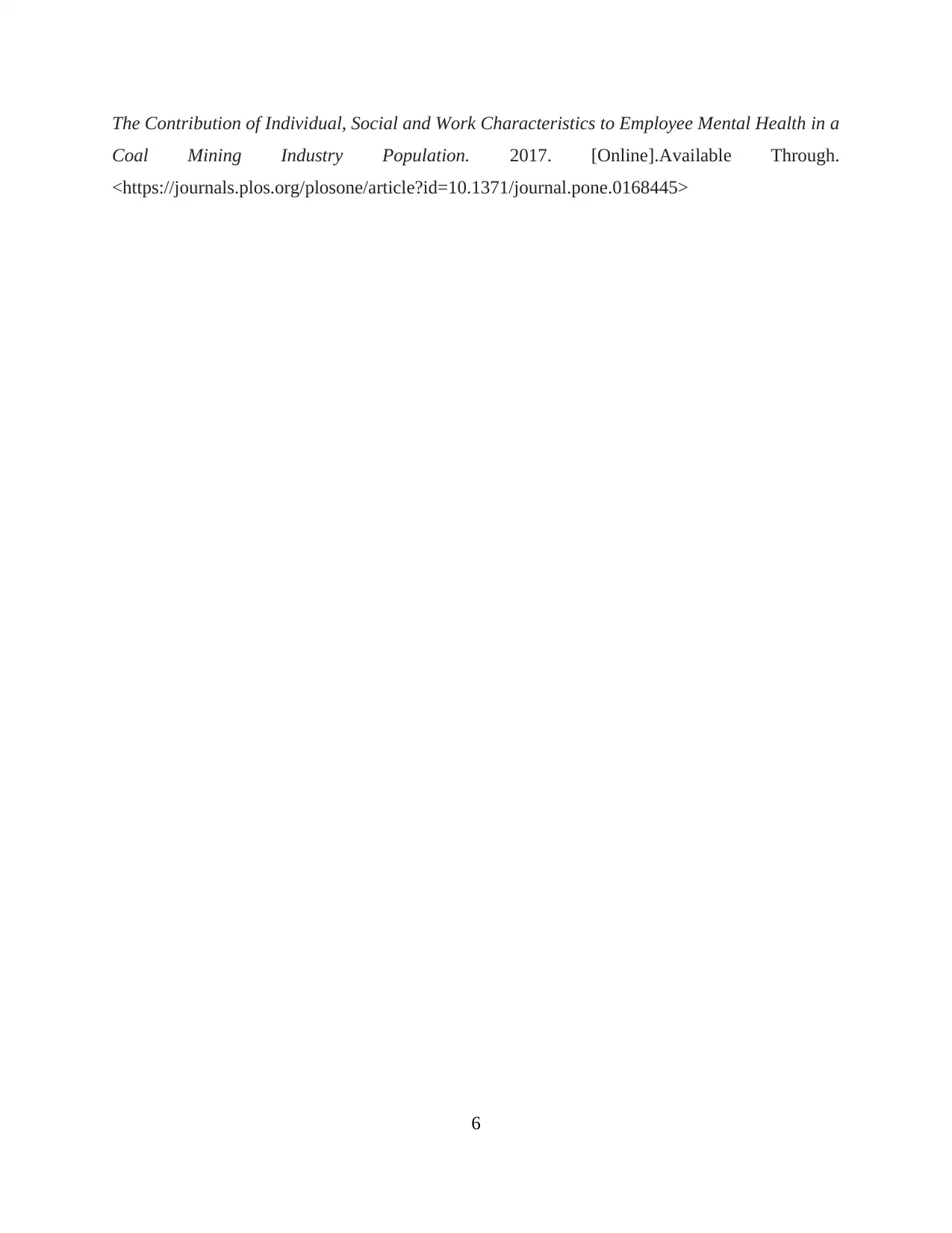
The Contribution of Individual, Social and Work Characteristics to Employee Mental Health in a
Coal Mining Industry Population. 2017. [Online].Available Through.
<https://journals.plos.org/plosone/article?id=10.1371/journal.pone.0168445>
6
Coal Mining Industry Population. 2017. [Online].Available Through.
<https://journals.plos.org/plosone/article?id=10.1371/journal.pone.0168445>
6
1 out of 8
Related Documents
Your All-in-One AI-Powered Toolkit for Academic Success.
+13062052269
info@desklib.com
Available 24*7 on WhatsApp / Email
![[object Object]](/_next/static/media/star-bottom.7253800d.svg)
Unlock your academic potential
Copyright © 2020–2026 A2Z Services. All Rights Reserved. Developed and managed by ZUCOL.





